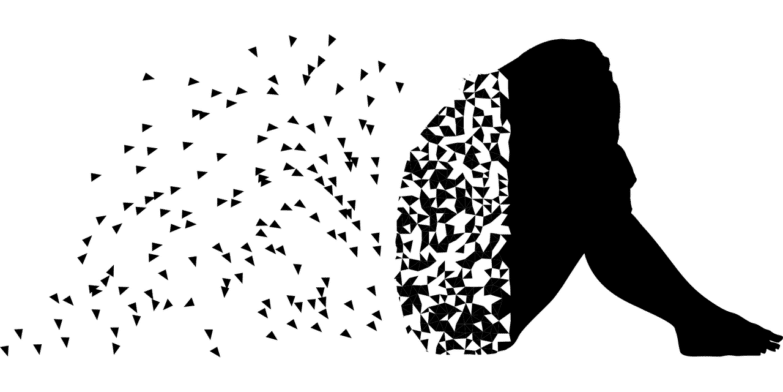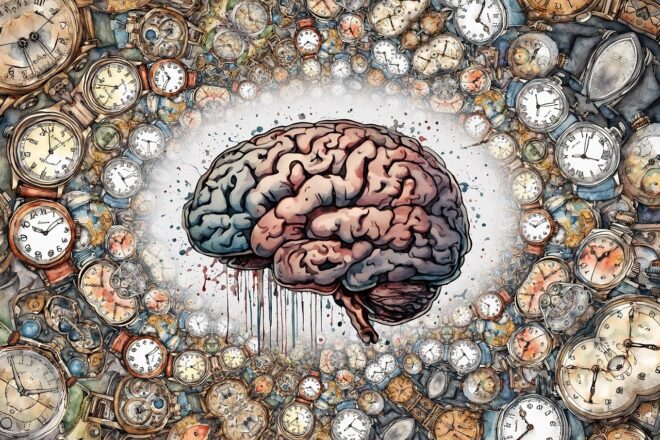Embarking on an exploration of the critical differences between Dementia and Normal Aging, we delve into the multifaceted nature of dementia – a condition characterized by symptoms that affect memory, cognitive abilities, and interfere with everyday life. It’s important to note the distinction that memory loss alone doesn’t point to dementia, with Alzheimer’s disease highlighted as the most common form of dementia in older adults.
The piece shines light on the various symptoms, underlying causes, types, and risk factors associated with dementia, reinforcing the striking correlation between old age, specifically post 65, and dementia.
Additionally, disorders such as Huntington’s disease, Traumatic brain injury, and Parkinson’s disease have been identified as potential triggers. Whilst some forms of dementia are irreversible, we learn that certain related symptoms can be reversed with apt treatment.
Above all, this composition underscores the profound impact of a healthy lifestyle in mitigating the risk of cognitive decline and dementia, emphasizing the significance of a balanced diet and regular exercise.
Hence, distinguishing between the signs of normal aging and the onset of dementia becomes crucial in facilitating early detection, timely intervention, and optimized management of the condition.
Understanding Dementia
Dementia refers to a group of symptoms affecting memory, cognitive function, and social abilities that interfere with day-to-day life. It’s not a standalone disease in itself, but a complex interaction of symptoms that can disrupt normal functioning. Understanding dementia requires considering its various manifestations and related disorders.
Definition and Symptoms of Dementia
In its simplest definition, dementia describes a condition involving cognitive impairment that’s severe enough to interfere with daily living. It’s characterized by memory loss but extends beyond to changes in thinking, judgment, and language.
It’s important to remember that having memory loss alone doesn’t mean you have dementia. Occasionally forgetting where you put your glasses is not unusual but forgetting recently learned information may be a cause for concern.
Cognitive and Psychological Changes in Dementia
Cognitive changes in dementia can take various forms. Memory loss is common, including forgetting recently learned information, important dates or events, or asking for the same information repeatedly.
There can also be difficulties with tasks that take some thought but used to be easy, such as balancing a checkbook or creating a recipe. Dementia can also cause trouble understanding visual images and spatial relations or lead to problems speaking or writing. On the psychological side, dementia is often linked with depression, anxiety, agitation, and even hallucinations.
Disorders Linked With Dementia
Dementia can be a symptom of several disorders. Alzheimer’s disease is the most common cause of progressive dementia in older adults, but there are a great number of other disorders linked to dementia too, such as Huntington’s disease, Traumatic brain injury, Creutzfeldt-Jakob disease, and Parkinson’s disease, among others.
Types of Dementia
There are several types of dementia, all of which progressively deteriorate mental functioning and are irreversible.
Alzheimer’s Disease
By far the most common form of dementia amongst older adults, Alzheimer’s disease slowly destroys memory and thinking skills, eventually disrupting the ability to carry out simple tasks.
Vascular Dementia
Tied to problems of circulation, vascular dementia occurs when vessels supplying blood to the brain are damaged, causing a series of small strokes that damage the brain over time resulting in difficulty thinking and memory issues.
Lewy Body Dementia
Characterized by certain protein deposits in the brain cells, Lewy body dementia can lead to a range of symptoms, from cognitive decline to visual hallucinations and movement disorders.
Frontotemporal Dementia
This type of dementia is linked to progressive nerve cell loss in the brain’s frontal lobes (the areas behind your forehead) or temporal lobes (the regions behind your ears) which leads to issues with behavior, language, and mental abilities.
Mixed Dementia
As the name suggests, mixed dementia involves the co-existence of Alzheimer’s disease and vascular dementia in the same brain.

Causes of Dementia
At the core of dementia are damage to or loss of nerve cells and their connections in the brain.
Damage to or Loss of Nerve Cells
The loss of coordination between nerve cells or the outright loss of nerve cells, and ultimately the regions of the brain these cells inhabit, is what causes the symptoms of dementia. The areas of the brain that get damaged determine the nature of the dementia symptoms.
Aging as a Risk Factor
While dementia isn’t a normal part of aging, age is still the strongest known risk factor for dementia. While it’s possible to develop dementia in one’s 40s or 50s, the risk doubles roughly every five years after age 65.
Underlying Medical Conditions Contributing to Dementia
Several underlying medical conditions or lifestyle factors can raise the risk of developing dementia. These include sustained high blood pressure, history of stroke, high cholesterol, obesity, cigarette smoking, and diabetes.
Reversible Causes of Dementia
While some causes of dementia are permanent and degenerative, others can be reversible, presenting as dementia-like symptoms.
Infections and Immune Disorders
Various infections and immune system disorders can lead to dementia-like symptoms. These can be treated and, oftentimes, reversed.
Metabolic or Endocrine Problems
Abnormalities in the metabolic or endocrine systems—like an underactive thyroid, a vitamin B12 deficiency, or hypoglycemia—can also mimic dementia, but these can be rectified with treatments that restore the body’s equilibrium.
Medicine Side Effects
At times, the side effects of particular medicines can mimic dementia, such as memory loss and confusion. These symptoms will typically pass when you stop taking the medication or lower the dosage.
Nutrient Deficiencies
Low levels of vitamins like B1 or B12 can produce a range of cognitive difficulties resembling dementia which can usually be reversed by dietary adjustments or supplements.

Understanding Normal Aging
Normal cognitive aging encompasses a variety of changes that occur in mental abilities over time.
Defining Normal Cognitive Aging
Normal cognitive aging can result in slower thinking and problem-solving, occasional difficulty with remembering names or words, and minor issues with learning new things. These are mildly frustrating at worst and don’t seriously impede daily life.
Differences Between Normal Forgetfulness and Serious Memory Problems
There are key differences between normal forgetfulness and the serious memory problems associated with dementia. While it’s normal to forget an appointment or the name of an acquaintance, dementia-related memory issues are more profound and constant—like forgetting recent experiences or not being able to remember one’s own address.
Distinguishing Between Dementia and Normal Aging
Distinguishing between the cognitive changes due to normal aging and those from dementia is critical to early detection and treatment.
Differences in Memory Loss
While both involve some degree of memory loss, the memory loss associated with dementia often affects recent memories first, and later interferes with older ones. In contrast, normal aging might mean forgetting a fact one moment and remembering it the next.
Impact on Daily Life
Dementia, unlike normal aging, affects not just memory but also other cognitive functions, enough to disrupt daily life.
Progressive Nature of Dementia Symptoms
Dementia symptoms get progressively worse over time, making tasks more difficult and leading to changing behaviors. Normal aging does not generally result in such severe changes.

Diagnostic Tests for Dementia
Reaching a diagnosis of dementia involves various tests, all designed to evaluate mental function and identify the underlying cause.
Neurological Evaluations
A neurological assessment aims to inspect your sense of balance, reflexes, eye movement, and speech—functions that if affected, could point towards dementia.
Brain Imaging
Brain scans can detect issues like tumors or evidence of strokes. They can also help identify shrinking or atrophy in specific brain areas, which can signal certain types of dementias.
Laboratory Tests
Various blood tests are often used to rule out other potential causes of memory loss and confusion, such as thyroid disorders or vitamin deficiencies.
Treatment Options for Dementia
While currently dementia can’t be cured, various treatments are available to manage its symptoms.
Medications for Dementia
Several prescription drugs can help slow the cognitive decline in Alzheimer’s disease and other dementias, at least temporarily. These typically work by affecting the chemicals that transmit messages between brain cells.
Non-Drug Approaches
There are also non-drug strategies, techniques and therapies designed to improve environment, organization, task simplification which can all aid in the mitigation of dementia symptoms.
Managing Dementia Symptoms at Home
By establishing everyday routines, enhancing the safety and functionality of your home, and staying active within your abilities, it’s possible to preserve quality of life with dementia.
Preventing Dementia and Cognitive Decline
While there’s no guaranteed way to prevent dementia, certain lifestyle choices may help.
Influence of a Healthy Lifestyle
Maintaining a healthy lifestyle has shown to reduce the risk of cognitive decline and dementia. This includes quitting smoking, controlling blood pressure, maintaining a healthy weight, and avoiding excessive alcohol.
Role of Regular Exercise and a Balanced Diet
Regular physical activity and a balanced diet have both been associated with brain health. Following a diet rich in fruits, vegetables, and lean protein, coupled with routine exercise can help protect the brain.
Cognitive Training and Mental Stimulation
Activities that stimulate your mind can help protect against cognitive decline. These can include reading, writing, playing a musical instrument, or any mind-stimulating games.
Support for Individuals and Families Living with Dementia
Navigating dementia is difficult not just for the individuals affected, but their families and caregivers too. Fortunately, many resources and forms of aid are available.
Counseling and Support Groups
Joining a counseling group or a support group can be hugely beneficial, offering a space to share experiences, advice, and coping strategies with others undergoing similar experiences.
Home Care and Assisted Living Options
As dementia progresses, the individual may need more care than can be provided at home. There are many options ranging from visiting home health aides, to full-time care in a nursing facility or memory care unit.
Planning for Future Care and Legal Decisions
It’s important to plan for the future once that diagnosis has been made. This can include discussing options for care, making decisions regarding power of attorney, living wills, and working through the associated financial issues.
Dementia is a challenging journey, not just for those diagnosed, but also for their families. Understanding dementia more completely helps to better manage its impact, seek appropriate treatment, and improve the quality of life for everyone involved.
